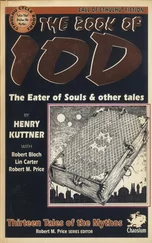Charles Henry Mackintosh - Notes on the Book of Deuteronomy, Volume I
Здесь есть возможность читать онлайн «Charles Henry Mackintosh - Notes on the Book of Deuteronomy, Volume I» — ознакомительный отрывок электронной книги совершенно бесплатно, а после прочтения отрывка купить полную версию. В некоторых случаях можно слушать аудио, скачать через торрент в формате fb2 и присутствует краткое содержание. Жанр: foreign_prose, foreign_antique, на английском языке. Описание произведения, (предисловие) а так же отзывы посетителей доступны на портале библиотеки ЛибКат.
- Название:Notes on the Book of Deuteronomy, Volume I
- Автор:
- Жанр:
- Год:неизвестен
- ISBN:нет данных
- Рейтинг книги:4 / 5. Голосов: 1
-
Избранное:Добавить в избранное
- Отзывы:
-
Ваша оценка:
- 80
- 1
- 2
- 3
- 4
- 5
Notes on the Book of Deuteronomy, Volume I: краткое содержание, описание и аннотация
Предлагаем к чтению аннотацию, описание, краткое содержание или предисловие (зависит от того, что написал сам автор книги «Notes on the Book of Deuteronomy, Volume I»). Если вы не нашли необходимую информацию о книге — напишите в комментариях, мы постараемся отыскать её.
Notes on the Book of Deuteronomy, Volume I — читать онлайн ознакомительный отрывок
Ниже представлен текст книги, разбитый по страницам. Система сохранения места последней прочитанной страницы, позволяет с удобством читать онлайн бесплатно книгу «Notes on the Book of Deuteronomy, Volume I», без необходимости каждый раз заново искать на чём Вы остановились. Поставьте закладку, и сможете в любой момент перейти на страницу, на которой закончили чтение.
Интервал:
Закладка:
We have been led into the foregoing line of thought in connection with the subject of the appointment of the elders, which is given to us in each book according to the wisdom of the Holy Ghost, and in perfect keeping with the scope and object of the book. We shall now proceed with our quotation.
"And I charged your judges at that time, saying, 'Hear the causes between your brethren, and judge righteously between every man and his brother, and the stranger that is with him. Ye shall not respect persons in judgment; but ye shall hear the small as well as the great ; ye shall not be afraid of the face of man ; for the judgment is God's; and the cause that is too hard for you, bring it unto me, and I will hear it.'"
What heavenly wisdom is here! what even-handed justice! what holy impartiality! In every case of difference, all the facts on both sides were to be fully heard and patiently weighed. The mind was not to be warped by prejudice, predilection, or personal feeling of any kind. The judgment was to be formed, not by impressions, but by facts—clearly established, undeniable facts. Personal influence was to have no weight whatever. The position and circumstances of either party in the cause were not to be considered. The case must be decided entirely upon its own merits. "Ye shall hear the small as well as the great." The poor man was to have the same even-handed justice meted out to him as the rich; the stranger as one born in the land. No difference was to be allowed.
How important is all this! how worthy of our attentive consideration! how full of deep and valuable instruction for us all! True, we are not all called to be judges or elders or leaders; but the great moral principles laid down in the above quotation are of the very utmost value to every one of us, inasmuch as cases are continually occurring which call for their direct application. Wherever our lot may be cast, whatever our line of life or sphere of action, we are liable, alas! to meet with cases of difficulty and misunderstanding between our brethren,—cases of wrong, whether real or imaginary; and hence it is most needful to be divinely instructed as to how we ought to carry ourselves in respect to such.
Now, in all such cases, we cannot be too strongly impressed with the necessity of having our judgment based on facts—all the facts on both sides. We must not allow ourselves to be guided by our own impressions, for we all know that mere impressions are most untrustworthy. They may be correct, and they may be utterly false. Nothing is more easily received and conveyed than a false impression, and therefore any judgment based on mere impressions is worthless. We must have solid, clearly established facts—facts established by two or three witnesses, as Scripture so distinctly enforces. (Deut. xvii. 6; Matt. xviii. 16; 2 Cor. xiii. 1; 1 Tim. v. 19.)
But further, we must never be guided in judgment by an ex parte statement. Every one is liable, even with the best intentions, to give a color to his statement of a case. It is not that he would intentionally make a false statement, or tell a deliberate lie; but through inaccuracy of memory, or one cause or another, he may not present the case as it really is. Some fact may be omitted, and that one fact may so affect all the other facts as to alter their bearing completely. " "Audi alteram partem ("Hear the other side") is a wholesome motto. And not only hear the other side, but hear all the facts on both sides, and thus you will be able to form a sound and righteous judgment. We may set it down as a standing rule, that any judgment formed without an accurate knowledge of all the facts is perfectly worthless. "Hear the causes between your brethren, and judge righteously between every man and his brother, and the stranger that is with him." Seasonable, needed words, most surely, at all times, in all places, and under all circumstances. May we apply our hearts to them.
And how important the admonition in verse 17! "Ye shall not respect persons in judgment; but ye shall hear the small as well as the great; ye shall not be afraid of the face of man." How these words discover the poor human heart! How prone we are to respect persons—to be swayed by personal influence—to attach importance to position and wealth—to be afraid of the face of man!
What is the divine antidote against all these evils? Just this: the fear of God. If we set the Lord before us, at all times, it will effectually deliver us from the pernicious influence of partiality, prejudice, and the fear of men. It will lead us to wait humbly and patiently on the Lord for guidance and counsel in all that may come before us, and thus we shall be preserved from forming hasty and one-sided judgments of men and things—that fruitful source of mischief amongst the Lord's people in all ages.
We shall now dwell for a few moments on the very affecting manner in which Moses brings before the congregation all the circumstances connected with the mission of the spies, which, like the appointment of the judges, is in perfect keeping with the scope and object of the book. This is only what we might expect. There is not, there could not be, a single sentence of useless repetition in the divine volume; still less could there be a single flaw, a single discrepancy, a single contradictory statement. The Word of God is absolutely perfect—perfect as a whole, perfect in all its parts. We must firmly hold and faithfully confess this in the face of this infidel age.
We speak not of human translations of the Word of God, in which there must be more or less of imperfection; though even here, we cannot but be "filled with wonder, love, and praise" when we mark the way in which our God so manifestly presided over our excellent English translation, so that the poor man at the back of a mountain may be assured of possessing, in his common English Bible, the revelation of God to his soul. And most surely we are warranted in saying that this is just what we might look for at the hands of our God. It is but reasonable to infer that the One who inspired the writers of the Bible would also watch over the translation of it; for inasmuch as He gave it originally, in His grace, to those who could read Hebrew and Greek, so would He not, in the same grace, give it in every language under heaven? Blessed forever be His holy name, it is His gracious desire to speak to every man in the very tongue in which he was born,—to tell us the sweet tale of His grace—the glad tidings of salvation in the very accents in which our mothers whispered into our infant ears those words of love that went right home to our very hearts. (See Acts ii. 5-8.)
Oh that men were more impressed and affected with the truth and power of all this, and then we should not be troubled with so many foolish and unlearned questions about the Bible.
Let us now hearken to the account given by Moses of the mission of the spies—its origin and its result. We shall find it full of most weighty instruction, if only the ear be open to hear and the heart duly prepared to ponder.
"And I commanded you at that time all the things which ye should do." The path of simple obedience was plainly set before them. They had but to tread it with an obedient heart and firm step. They had not to reason about consequences, or weigh the results; all these they had just to leave in the hands of God, and move on with steady purpose in the blessed path of obedience.
"And when we departed from Horeb, we went through all that great and terrible wilderness , which ye saw by the way of the mountain of the Amorites, as the Lord our God commanded us; and we came to Kadesh-barnea. And I said unto you, 'Ye are come unto the mountain of the Amorites, which the Lord our God doth give unto us. Behold, the Lord thy God hath set the land before thee: go up and possess it, as the Lord God of thy fathers hath said unto thee; fear not, neither be discouraged.'"
Читать дальшеИнтервал:
Закладка:
Похожие книги на «Notes on the Book of Deuteronomy, Volume I»
Представляем Вашему вниманию похожие книги на «Notes on the Book of Deuteronomy, Volume I» списком для выбора. Мы отобрали схожую по названию и смыслу литературу в надежде предоставить читателям больше вариантов отыскать новые, интересные, ещё непрочитанные произведения.
Обсуждение, отзывы о книге «Notes on the Book of Deuteronomy, Volume I» и просто собственные мнения читателей. Оставьте ваши комментарии, напишите, что Вы думаете о произведении, его смысле или главных героях. Укажите что конкретно понравилось, а что нет, и почему Вы так считаете.












